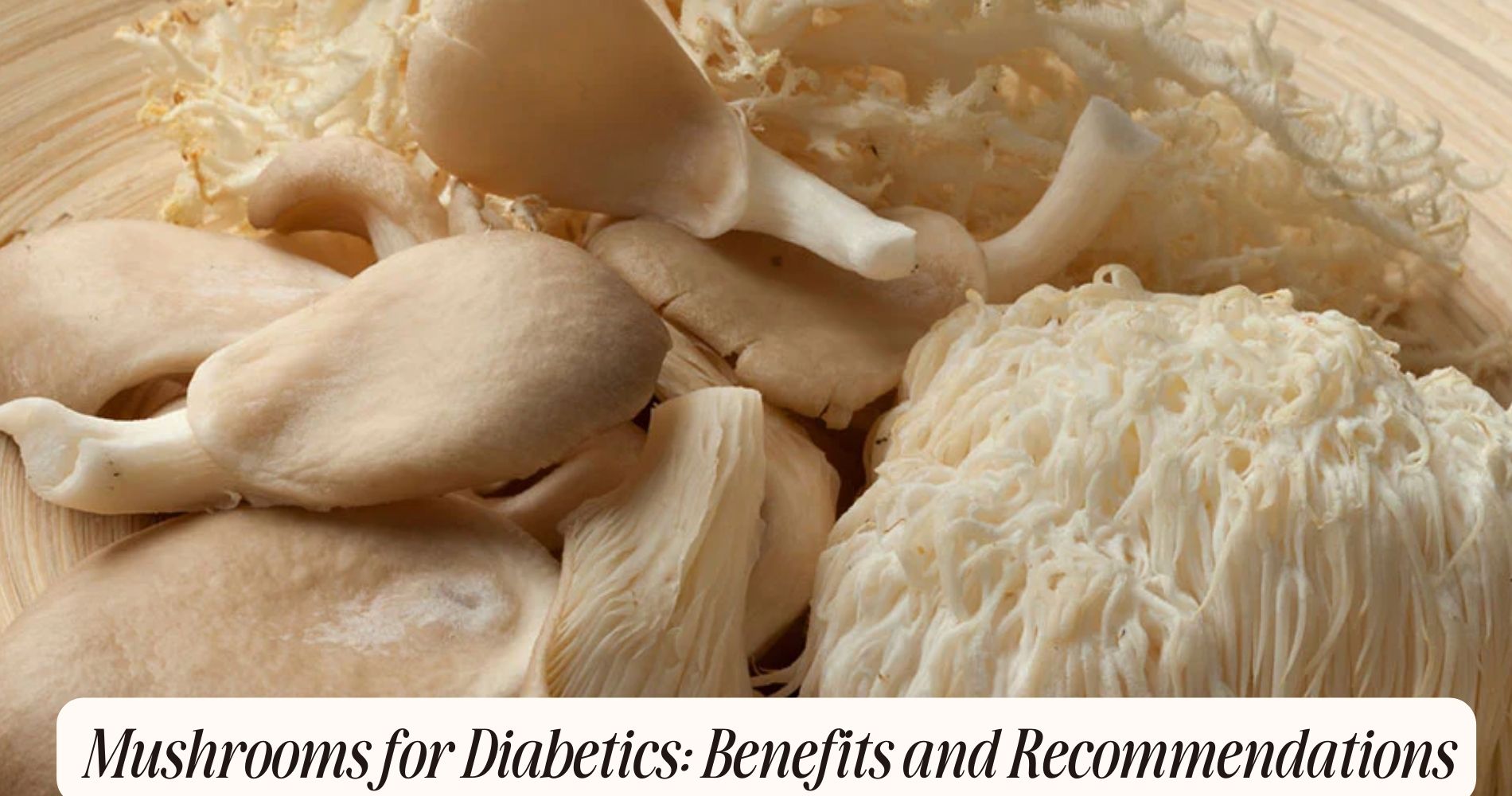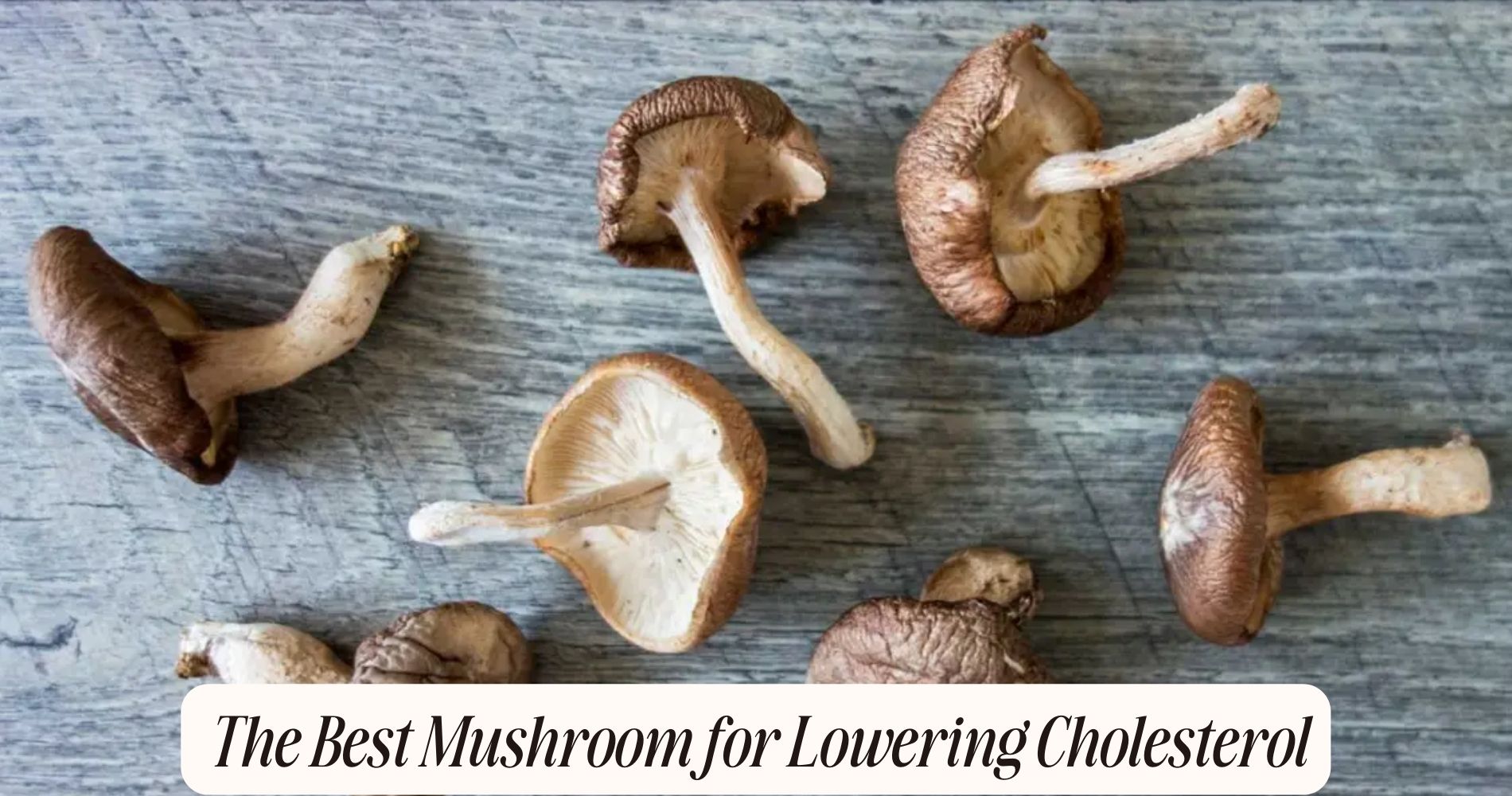
Mushrooms for Diabetics: Benefits and Recommendations
Health Benefits of Mushrooms for Diabetics
Exploring the health benefits of mushrooms for diabetics reveals their potential to positively impact blood sugar levels and overall health management. Mushrooms possess remarkable medicinal properties that can aid individuals in glycemic control. Studies suggest that certain compounds found in mushrooms may help regulate blood glucose levels, making them a valuable addition to the diet of individuals with diabetes.

One of the key ways mushrooms contribute to improving glycemic control is through their high fiber content. Fiber slows down the absorption of sugar in the bloodstream, preventing spikes in blood glucose levels after meals. Additionally, mushrooms are low in carbohydrates and calories, making them an ideal choice for those looking to manage their weight and blood sugar levels effectively.
Incorporating mushrooms into your meals as part of a balanced diet can offer numerous health benefits beyond glycemic control. As you explore the diverse varieties of mushrooms available, consider adding them to your favorite dishes to enhance both flavor and nutritional value.
Nutritional Value of Mushrooms
Explore the nutritional value of mushrooms to understand their significance in your diet as a diabetic.
Discover the rich nutrient content that mushrooms offer, including essential vitamins, minerals, and antioxidants beneficial for managing diabetes.
Learn about the health benefits of mushrooms and cooking tips tailored to support your diabetic lifestyle.
Mushroom Nutrient Content
The nutritional value of mushrooms is often underestimated, yet these fungi are rich in essential nutrients that can benefit individuals looking to maintain a healthy diet. Mushrooms are low in calories but high in important nutrients like vitamin D, potassium, and B vitamins. They also contain antioxidants, such as selenium and ergothioneine, which help protect cells from damage.
Whether consumed raw in salads, sautéed with garlic and herbs, or added to soups and stews, mushrooms retain their nutritional value. To maximize their health benefits, consider light cooking methods like grilling or roasting, as excessive heat can destroy some of the delicate nutrients. Including mushrooms in your diet can be a flavorful way to enhance your overall nutrient intake.
Health Benefits Overview
Mushrooms offer a wealth of health benefits due to their rich nutritional content, making them a valuable addition to your diet for overall well-being. These fungi are low in calories but high in essential nutrients like vitamins (such as riboflavin, niacin, and vitamin D) and minerals (such as selenium, potassium, and copper).
They're also a good source of dietary fiber and antioxidants, which play an important role in supporting your immune system and reducing inflammation. Mushrooms have been linked to various health benefits, including improved heart health, better blood sugar control, and enhanced weight management.
Adding mushrooms to your meals can provide you with a nutritious and delicious way to support your health goals.
Cooking Tips for Diabetics
With their impressive nutritional profile, mushrooms can be a valuable addition to your diet, especially if you're looking for cooking tips tailored to managing diabetes.
When meal planning, opt for cooking methods like grilling, roasting, or sautéing with minimal oil to enhance the flavors without adding excess calories.
Portion control is key; aim to fill half your plate with non-starchy vegetables like mushrooms, a quarter with lean protein, and the remaining quarter with whole grains or legumes.
Experiment with different mushroom varieties to add variety to your meals while keeping them low in carbohydrates.
Impact on Blood Sugar Levels
Research suggests that incorporating mushrooms into your diet may have a positive impact on regulating blood sugar levels. Mushrooms are low in carbohydrates and calories, making them a suitable option for individuals looking to manage their blood sugar levels effectively. They've a low glycemic impact, which means they don't cause significant spikes in blood glucose levels after consumption. This quality is particularly beneficial for diabetics as it supports better blood sugar control throughout the day.

Several studies have indicated that certain compounds found in mushrooms, such as polysaccharides and antioxidants, may play a role in improving insulin sensitivity and reducing inflammation in the body. These effects can contribute to better overall blood sugar management and potentially lower the risk of complications associated with diabetes.
Best Mushroom Varieties for Diabetics
When managing diabetes, selecting the right mushrooms can make a significant difference. Explore the top diabetic-friendly mushroom varieties, along with useful cooking tips and tricks, to incorporate these nutritious fungi into your diet.
Discover the nutritional benefits of different mushrooms to make informed decisions about your dietary choices.
Top Diabetic-Friendly Mushrooms
Discover the top diabetic-friendly mushrooms that can be beneficial for managing blood sugar levels effectively.
When it comes to mushroom varieties suitable for diabetes management, consider incorporating shiitake, maitake, and reishi mushrooms into your meals. These varieties contain compounds that may help regulate blood sugar levels and offer additional health benefits.

Shiitake mushrooms are rich in polysaccharides that could aid in improving insulin sensitivity, while maitake mushrooms may assist in lowering blood glucose levels. Reishi mushrooms have been linked to potentially enhancing insulin production and reducing insulin resistance.
Including these mushrooms in your diet can be a flavorful and nutritious way to support your diabetes management. Stay tuned for delicious mushroom recipes in the upcoming sections.
Cooking Tips and Tricks
For diabetics looking to enhance their meals with beneficial mushroom varieties, consider incorporating shiitake, maitake, and reishi mushrooms for their potential to support blood sugar management.
When cooking these mushrooms, amplify their natural flavors with a variety of flavorful seasonings such as garlic, ginger, and low-sodium soy sauce. These seasonings not only enhance taste but also bring additional health benefits.
Utilize cooking techniques like sautéing, grilling, or roasting to maintain the mushrooms' nutrients while creating delicious dishes. Avoid heavy creams or butter-laden preparations that can add unnecessary calories and unhealthy fats.
Experiment with different recipes and combinations to find the most enjoyable ways to incorporate these diabetic-friendly mushrooms into your diet.
Nutritional Benefits Highlighted
Enhance your diabetic-friendly meal plans by selecting shiitake, maitake, and reishi mushrooms known for their potential to support blood sugar management. These mushroom varieties offer numerous health benefits for individuals with diabetes.
Shiitake mushrooms are rich in polysaccharides that may help regulate blood sugar levels. Maitake mushrooms contain beta-glucans, known for their positive effects on insulin sensitivity. Reishi mushrooms are packed with antioxidants like triterpenes, which could aid in managing diabetes complications.
When meal planning, consider incorporating these nutrient-dense mushrooms into your dishes. To optimize their nutrient content, try sautéing them with olive oil and garlic, or adding them to soups and stir-fries. Including these mushrooms in your meal preparation can be a delicious way to support your overall health while managing diabetes.
Cooking Tips for Diabetic-Friendly Meals
When preparing meals for individuals with diabetes, prioritizing fresh ingredients and mindful cooking techniques can have a substantial impact on blood sugar control and overall health. Meal planning is essential for managing diabetes. Focus on incorporating a balance of carbohydrates, proteins, and healthy fats in each meal to help regulate blood sugar levels. When planning your meals, consider using whole grains, lean proteins, and plenty of vegetables to create a well-rounded plate.
Ingredient substitutions are key in making diabetic-friendly meals. Opt for healthier cooking oils like olive or avocado oil instead of saturated fats. Use herbs, spices, and citrus juices to add flavor without relying on salt or sugar. Replace refined sugars with natural sweeteners like stevia or monk fruit when baking or cooking. When cooking with mushrooms, consider grilling, roasting, or sautéing them with minimal oil to retain their nutrients and flavors.
Mushroom Supplements for Diabetes
Consider incorporating mushroom supplements into your diabetes management plan to potentially benefit from their unique properties. Mushroom supplements have shown promise in helping manage diabetes due to their potential to improve blood sugar levels and insulin sensitivity. Studies suggest that certain compounds found in mushrooms, such as polysaccharides and beta-glucans, may have a positive impact on glucose metabolism.
When considering supplement effectiveness, it's crucial to choose high-quality products from reputable brands to guarantee you're getting the most benefit. Look for supplements that specifically mention their active ingredients and have been tested for purity and potency.
Dosage recommendations for mushroom supplements can vary depending on the type of mushroom extract and your individual health needs. It's advisable to consult with a healthcare provider or a nutritionist to determine the appropriate dosage for you. Starting with a low dose and gradually increasing it while monitoring your blood sugar levels closely is a prudent approach to incorporating mushroom supplements into your diabetes management plan.
Risks and Precautions
To guarantee safe usage of mushroom supplements for diabetes management, understanding the potential risks and necessary precautions is essential. When contemplating incorporating mushrooms into your diabetic diet, it's vital to be aware of risk management and dietary precautions. Safety concerns must be taken seriously to avoid adverse health implications.
One risk to consider is the potential for allergic reactions to certain types of mushrooms. If you have a known mushroom allergy or are unsure, consult with a healthcare provider before introducing new varieties into your diet. Additionally, some mushrooms may interact with medications used to manage diabetes, impacting blood sugar levels. It's important to monitor your blood sugar closely when starting to include mushrooms in your meals.
To mitigate risks, start with small portions of mushrooms and observe how your body reacts. Be cautious when trying new varieties and ensure they're properly cooked to avoid any digestive issues. By staying informed and practicing dietary precautions, you can safely incorporate mushrooms into your diabetic diet.
Incorporating Mushrooms Into Diabetic Diet
Incorporating mushrooms into your diabetic diet can enhance nutritional diversity and potentially aid in blood sugar management. Mushrooms are low in calories and carbohydrates, making them an excellent choice for individuals with diabetes. When planning your diabetic meals, consider adding mushrooms to increase the fiber content and promote feelings of fullness, which can help with weight management and blood sugar control.

To include mushrooms in your diet, you can explore various mushroom recipes that cater to your taste preferences. Whether you enjoy them sautéed, grilled, or added to soups and salads, mushrooms can add a savory umami flavor to your meals without notably impacting your blood sugar levels.
When incorporating mushrooms into your diabetic meal planning, focus on balance and portion control. Combine mushrooms with other nutrient-dense foods like lean proteins, whole grains, and vegetables to create well-rounded and satisfying meals. Experiment with different cooking methods and flavor combinations to keep your diabetic diet enjoyable and sustainable.
Recipes Featuring Mushrooms
Enhance your diabetic meal repertoire with flavorful and nutrient-rich recipes featuring mushrooms. Incorporating a mushroom medley into your dishes can add depth and variety to your meals while providing numerous health benefits.
One delicious option is a savory mushroom stir-fry, combining different types of mushrooms like shiitake, button, and oyster, with colorful bell peppers and onions for a burst of flavors.
Another idea is a creamy mushroom risotto, using arborio rice cooked with a mixture of mushrooms, garlic, and a splash of white wine for a rich and satisfying meal.
For a lighter option, try a grilled portobello mushroom burger, where the meaty texture of the portobello makes it a great substitute for traditional beef patties.
These savory mushroom dishes not only taste delicious but also offer a good source of fiber, vitamins, and minerals that can support a diabetic-friendly diet. Experimenting with different mushroom recipes can help diversify your meals and keep your taste buds satisfied while managing your diabetes effectively.
Expert Recommendations
When considering mushrooms for managing diabetes, it's vital to understand the nutritional benefits they offer.
Different mushroom varieties can have varying impacts on blood sugar levels, so it's important to know which ones are recommended for diabetics.
Expert recommendations often emphasize the significance of incorporating these nutrient-rich fungi into a balanced diet for better blood sugar control.
Nutritional Benefits of Mushrooms
For those seeking expert recommendations on the nutritional benefits of mushrooms, understanding their unique composition can provide valuable insight into their potential health advantages.
Mushrooms are low in calories but rich in nutrients like vitamins B and D, selenium, potassium, and antioxidants. Their culinary uses are versatile, making them a great addition to various dishes, providing a meaty texture and umami flavor.
In addition to their culinary benefits, mushrooms have various health properties. They're known to boost the immune system, reduce inflammation, and improve heart health.
Incorporating mushrooms into your diet can be a delicious way to enhance your overall wellness and enjoy a range of essential nutrients that support a healthy lifestyle.
Recommended Mushroom Varieties
To explore the diversity of mushrooms that offer exceptional nutritional value, consider these expert recommendations for recommended mushroom varieties.
When it comes to mushroom selection for diabetic-friendly options, focus on varieties like shiitake, maitake, and reishi. Shiitake mushrooms contain beta-glucans that may help regulate blood sugar levels.
Maitake mushrooms have been studied for their potential to improve insulin sensitivity. Reishi mushrooms are known for their anti-inflammatory properties and may aid in managing diabetes-related inflammation.

Additionally, oyster mushrooms are low in calories and carbohydrates, making them a good choice for diabetic meal planning. Including these recommended mushroom varieties in your diet can offer a flavorful way to support your health while managing diabetes.
Boost Your Health with 10-IN-1 MUSHROOM GUMMIES
As you consider the benefits of mushrooms for diabetes management, why not enhance your daily wellness routine with 10-IN-1 MUSHROOM GUMMIES by Well Gummies? This easy-to-use, chewable supplement is loaded with 10 functional mushrooms, tailored to boost your energy, sharpen your focus, and support your immune system. These vegan gummies are infused with the delicious taste of fresh wild berries, making them as enjoyable as your favorite candy, but without any jitters or crashes. Perfect for those seeking a natural way to maintain a balanced body and clear mind, Well Gummies offers a convenient solution to incorporate the power of mushrooms into your diet every day.
Frequently Asked Questions
Can Mushrooms Cure Diabetes?
You can't rely on mushrooms to cure diabetes. While mushroom supplements might have some benefits for managing blood sugar levels, they are not a cure. Be aware of potential risks and always consult your healthcare provider.
Are Canned Mushrooms Diabetic-Friendly?
When it comes to canned mushrooms, fresh ones are often a better choice for diabetics due to lower sodium content. Opt for fresh mushrooms and consider healthy cooking methods like sautéing or grilling for a nutritious meal.
Do All Mushroom Varieties Have the Same Benefits for Diabetics?
Different mushroom varieties offer varying benefits for diabetics. Nutritional differences impact glycemic index and portion sizes. Consider cooking methods to retain nutrients. Explore options like shiitake, maitake, or reishi for diverse health advantages.
Can Mushrooms Replace Medication for Diabetes?
You should consult with a healthcare provider before considering mushrooms as a replacement for diabetes medication. While they offer natural alternatives and can be part of dietary management, medication adjustments should be made under professional guidance.
Are There Any Mushrooms to Avoid for Diabetic Individuals?
When considering mushroom cooking for your dietary restrictions as a diabetic, avoid high-sodium canned mushrooms and heavily processed mushroom products. Opt for fresh or dried mushrooms cooked in healthier ways to support your health goals.
Conclusion
To sum up, mushrooms offer numerous health benefits for diabetics due to their low calorie and carbohydrate content, high fiber, and various vitamins and minerals.
Incorporating mushrooms into a diabetic diet can help regulate blood sugar levels and improve overall health. It's important to choose the right mushroom varieties and cooking methods to maximize their benefits.
Consult with a healthcare provider or nutritionist for personalized recommendations and enjoy delicious mushroom recipes to support your diabetic-friendly meals.




